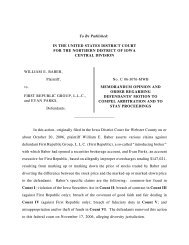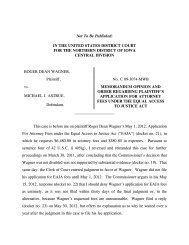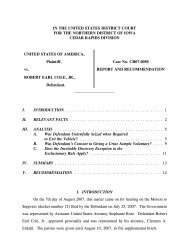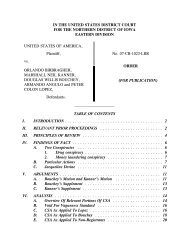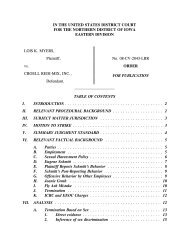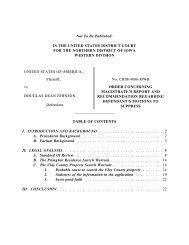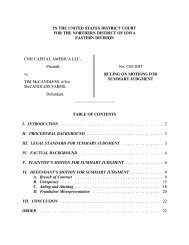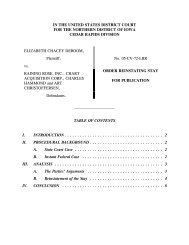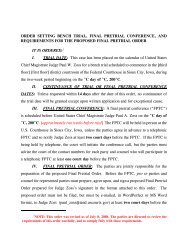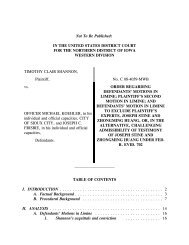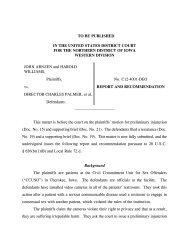Galm v. Eaton Corporation - Northern District of Iowa
Galm v. Eaton Corporation - Northern District of Iowa
Galm v. Eaton Corporation - Northern District of Iowa
You also want an ePaper? Increase the reach of your titles
YUMPU automatically turns print PDFs into web optimized ePapers that Google loves.
Given these five physicians and one psychologist were in unanimity in their<br />
conclusion that <strong>Galm</strong> was not disabled under the “any occupation” requirement <strong>of</strong> the Plan,<br />
it is the opinion <strong>of</strong> this court that, based upon the record before the plan administrator,<br />
<strong>Eaton</strong> did not abuse its discretion in determining that <strong>Galm</strong> was not disabled under the<br />
terms <strong>of</strong> the Plan for second-tier long term disability benefits. This court is satisfied that<br />
based upon the record before the plan administrator that the plan administrator's decision<br />
was supported by substantial evidence and was thus reasonable. See Jackson, 303 F.3d at<br />
887 (stating that a “decision is reasonable if a reasonable person could have reached a<br />
similar decision, given the evidence before him, not that a reasonable person would have<br />
reached that decision”). Therefore, the court concludes that <strong>Eaton</strong> is entitled to judgment<br />
in its favor on <strong>Galm</strong>’s claim under ERISA.<br />
III. CONCLUSION<br />
The court concludes that, as a matter <strong>of</strong> law, on the record here, <strong>Eaton</strong>’s decision<br />
to deny <strong>Galm</strong> second-tier long term disability benefits is supported by substantial evidence.<br />
Therefore, the court finds that <strong>Eaton</strong> is entitled to judgment in its favor on <strong>Galm</strong>’s claim<br />
under ERISA. The denial <strong>of</strong> second- tier long term disability benefits was not an abuse <strong>of</strong><br />
discretion as a matter <strong>of</strong> law, because <strong>Eaton</strong>’s interpretation <strong>of</strong> the Plan was not<br />
unreasonable and there was substantial evidence supporting <strong>Eaton</strong>’s determination that <strong>Galm</strong><br />
was not “disabled” within the meaning <strong>of</strong> the Plan.<br />
\<br />
30



